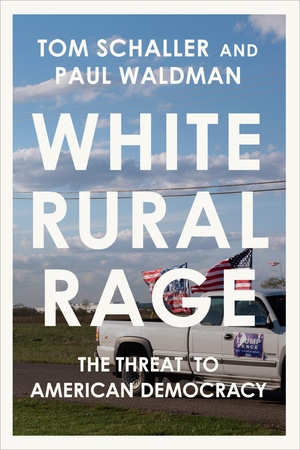
White Rural Rage: The Threat to American Democracy
Thomas F. Schaller, Paul Waldman, Tom Schaller
About the Author

Thomas F. Schaller
Questions & Answers
The demographic and political power of white rural voters threatens American democracy in several ways. Firstly, their disproportionate influence in the Senate, Electoral College, and gerrymandered districts allows them to sway national policy despite being a minority. This leads to minority rule, as seen with the Republican Party's control of the Supreme Court despite receiving fewer votes. Secondly, rural whites' high levels of racism, xenophobia, and anti-democratic attitudes undermine democratic norms and institutions. Their resentment towards racial and religious minorities, immigrants, and urban residents fosters division and hinders constructive dialogue. Lastly, their tendency to accept conspiracy theories and reject democratic principles poses a significant threat to the stability and integrity of American democracy.
The four main threats white rural voters pose to American democracy are:
-
Racism, Xenophobia, Anti-Urban Disdain, and Anti-Immigrant Sentiment: Rural whites exhibit strong animosity towards racial and religious minorities, immigrants, and urban residents, leading to a rejection of pluralism and inclusion.
-
Acceptance of Conspiracies as Facts: They are more likely to believe in false claims and conspiracies, such as election fraud, which undermines the legitimacy of democratic processes.
-
Anti-Democratic Beliefs: This includes opposition to democratic norms like checks and balances, free press, and ballot access, and support for authoritarian and White Christian nationalist movements.
-
Justification of Violence: Rural whites are more likely to excuse or applaud political violence, including the January 6 Capitol attack, which threatens the peaceful transfer of power.
These threats interact by reinforcing each other. For example, racism and conspiracy beliefs can lead to anti-democratic actions, while anti-democratic beliefs can justify violence against perceived enemies. This interconnectedness creates a dangerous cycle that undermines American democracy.
The cultural narrative portraying rural America as the "real America" has significantly contributed to the current political climate and the rise of white rural rage. This narrative, often perpetuated by both political parties, reinforces a sense of superiority and exclusion among rural whites. It fosters a belief that their values and experiences are superior to those of urban and suburban Americans, leading to resentment and a desire for change. This narrative has been exploited by politicians like Trump, who stoked these feelings to gain support. It has also led to a lack of attention to rural minorities' struggles, exacerbating inequality. The result is a political climate where white rural rage is on the rise, threatening American democracy and reinforcing divisions.
The growing rural-urban divide poses significant threats to American democracy. Rural Whites, who are a minority but hold disproportionate power due to Senate malapportionment and gerrymandering, often vote for conservative Republicans who exacerbate rural anger rather than addressing economic and health issues. This perpetuates a cycle of despair and resentment, leading to radical and potentially violent ideologies. To address this, rural Americans need to organize and demand change, focusing on constructive solutions rather than cultural grievances. Both parties should engage with rural needs, and rural Whites should recognize the real sources of their problems and work towards a more inclusive and democratic future.
Rural America can move beyond decline and resentment by fostering a new political movement that addresses its economic and social challenges. This movement should focus on:
-
Demanding Change: Rural citizens must demand policies that address economic stagnation, population decline, and health crises. This includes advocating for infrastructure improvements, healthcare access, and education.
-
Embracing Diversity: Rural areas can benefit from embracing diverse populations, which can bring new economic opportunities and perspectives. This requires overcoming racial and cultural resentments.
-
Building a Political Agenda: Rural Whites need to develop a coherent set of demands that both parties must address. This would empower them to negotiate for better policies and outcomes.
-
Engaging in Politics: Rural citizens should participate in politics beyond voting, by engaging in community organizing, advocacy, and policy discussions.
-
Promoting Economic Diversification: Transitioning from resource extraction to industries like tourism, agriculture, and technology can create new opportunities and stabilize rural economies.
By taking these steps, rural America can contribute positively to the nation's future by becoming a more vibrant, inclusive, and economically stable part of the country.